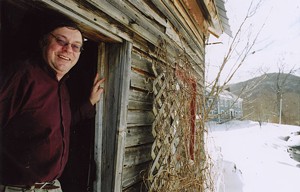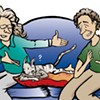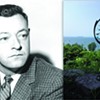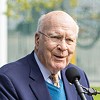Published March 12, 2008 at 10:12 a.m.
Finding the right chef is a tall order for any restaurant. But it's almost impossible when the dining room is on a dirt road 8 miles from the nearest town, and the job includes making breakfast and dinner for up to 40 discriminating guests every day, singlehandedly. More humbling duties: In the winter, hungry skiers require huge vats of soup and multiple batches of chocolate-chip cookies. In the summer, there are weddings to cook for — up to 11 in a four-month period.
Proprietor Tony Clark groans when asked how many cooks have come and gone since he bought Blueberry Hill Inn in Goshen almost 40 years ago. "A couple of dozen," he offers, along with some of the reasons for their respective departures: "alcoholism, male chauvinism, depression — you name it."
That the "right chef" would find him is the last thing Clark expected. But nine years ago, Tim Cheevers decided to check out Blueberry Hill while visiting Vermont from his native England. He had read about the place online. "I dropped by one day, and that was it," is how the laconic Cheevers recalls the encounter that changed the course of his culinary career.
"He and I connected," says Clark, who is also British but much chattier than Cheevers. "We had gin and tonics. We went out for supper. I didn't know who he was. He didn't tell me, either."
Cheevers told Clark only that he had learned to cook "in the British Army." It wasn't until Cheevers accidentally overstayed his visitor's visa — two years after he started cooking at Blueberry Hill — that an immigration lawyer hired by Clark discovered how high his chef ranked on the foodie chain. Cheevers never mentioned that he'd delivered canapés to the Queen, or that he served as chef de cuisine at Thornbury Castle, or that he earned a red "M" from the Michelin Guide for the restaurant he owned and ran for 11 years. In 1998, Cheevers was elected a Master Chef of Great Britain.
True to form, the now-green-card-carrying Cheevers reveals none of these details in a pre-dinner interview. He's an anti-celebrity chef. Even the serving window that gives guests a glimpse into the kitchen may be too much spotlight for the unassuming 53-year-old, who appears perfectly habituated to the isolation of his job — he's the first Blueberry Hill chef to live on the premises, in a rustic cabin he refers to as a "hut."
Cheevers is friendly without being engaging and tends to give one-word answers. Does he miss the exposure that comes with running a top-rated restaurant? "I've done that, been there," Cheevers blurts. "It's quite satisfying just being able to come up with a different menu every night."
Unlike a commercial eatery, where people show up at all hours and choose from a variety of items, Blueberry Hill serves the same meal to all of its guests — barring dietary restrictions. Non-guests are accommodated if they reserve early enough and there's room at the table. The entire group eats, family-style, at 7 p.m. But the inn's country-style dining room is no mess hall. The table service is impeccable, and Cheevers keeps the courses coming like clockwork.
On a recent Saturday evening, while the guests are getting acquainted over crackers and cheese, he's putting the finishing touches on 20 servings of homemade potato gnocchi in a tomato coulis. While the grateful diners tuck into the tender pasta pillows topped with oven-crisped Parmesan, Cheevers is plating a refreshing salad with Vermont blue cheese dressing and roasted pine nuts. Then he's on to maple-glazed magret duck, fondant potatoes, steamed broccoli and salsify in crème fraiche. Four vegetarians get an artichoke-and-goat-cheese concoction wrapped in phyllo dough. By the time dessert issues forth — homemade cheesecake with fresh fruit sauce — Cheevers has already mixed up the dry ingredients for tomorrow morning's blueberry pancake breakfast.
"He's very, very organized, which I'm not," says Clark, noting a good chef has to be consistently good. He would cover for Cheevers if the latter were ever sick — but he hasn't missed a single meal in nine years.
Clark says Cheevers has mastered the timing skills that go into serving a lavish meal to a large number of people. "There's never a half-hour delay, or even a 10-minute delay," he notes with awe.
"If the electricity goes off, Tim can start the generator," says Clark. "His background in the army comes in here."
London-born Cheevers enlisted when he was 16, and was trained by the Army Catering Corps. "I'm not sure they do anymore, but they had their own college," Cheevers says. "I spent two years there, learning to cook as well as shooting guns and stuff." He was attached to a regiment called the Royal Highland Fusiliers, which took him to Singapore. "The officers ate pretty well," Cheevers notes. "I kind of moved up."
The same regiment spent a summer on a base near the Queen's summer castle in Scotland. Cheevers remembers being bussed in "with a bunch of canapés" for a cocktail party at Balmoral. Prince Charles benefited from Cheevers' talents at the regular officers' mess.
After the army, Cheevers worked at four different restaurants — including a casino, "where money was no object," he recalls. "That was an eye-opening experience, because I saw stuff I'd never seen before" — such as sea urchins delivered daily. In 1983, Cheevers was named chef de cuisine at Blake's Hotel in South Kensington, London, which prompted U.K. Vogue to profile him in a glowing restaurant feature.
The food critics followed when Cheevers left Blake's to run the kitchen at the exclusive Thornbury Castle. His menu was among those singled out by The New York Times in a 1984 piece titled "Britain's Restaurant Revolution."
What Cheevers really wanted, though, was his own place. He got it and, in a rare display of self-promotion, named it after himself. Cheevers opened in 1985, 30 miles south of London, with 32 seats and a menu that changed monthly. Cheevers was serving mousse of Cornish crab wrapped in spinach and quenelles of pike in watercress sauce back when most British chefs were still stuck on steak-and-kidney pie and plum pudding.
"It was pretty successful," Cheevers notes. Read: It got recognition from the Michelin Guide, which was the food authority back then. "But I found after 11 years, I had had enough," Cheevers goes on. The chef was responsible for repairs on the venerable Victorian building he leased for the restaurant. "That sucks," he says with a chortle. "When you're pouring money into a building that's not yours, it's time to get out." In 1996, he sold the business, but not the Cheevers name.
Now, Cheevers' moniker and Blueberry Hill's get equal weight on the white chef coat he dons for dinner. He seems fine with that arrangement, even a little relieved. Cheevers' vast experience as a small-business owner appears to have engendered a rare empathy for his employer. He has no trouble sticking to a food budget, for example. "I appreciate where the money goes — how, when you've just got four guests, you can't have six staff. I can work with that," Cheevers says.
He also appears to like the schedule: double shifts for months on end, with very few days off, followed by three-week paid vacations. At the end of March, Cheevers will head to Tasmania to see his former restaurant partner, who is now in the wine business.
When he gets back, Clark points out, he'll be happy to find a bunch of paychecks waiting for him. Also, business tends to be slower in the early spring and late fall. When no guests are expected, Cheevers gets a day off. It's always last-minute, but he likes going to Montréal. Closer to home is Café Provence in Brandon.
Just don't look for Cheevers in the woods — on skis, hunting or doing anything else he considers "sporty." When he's not planning or prepping for meals, the chef is on his computer — he just bought a second one. He operates a web-design business on the side and has been a "great help" in improving Blueberry Hill's e-commerce, says Clark.
Cheevers' willingness to live in a little barn on the inn's grounds — formerly Goshen's original blacksmith shop, complete with bellows — is another huge plus for Clark. There's no worrying about whether he's going to make it to work; he's 200 feet from the kitchen. Which is good, because the road that serves Blueberry Hill is as challenging as it is beautiful.
Cheevers likes the isolation. "It's fine. I've got satellite TV," he quips. He happily recounts how the "HD guy" recently likened his satellite-dish-adorned place to "a government installation."
Clark refers to Cheevers' home as the "Qaddafi shack." And it does have a sultanish quality once you pass through the thick muslin curtains that separate the living area from a messy storage room that serves as the entry way. Cheevers has adorned all the walls and ceilings with the same fabric to cover the silver insulation underneath. Despite all that, he can feel the wind's chill inside when it gets really cold.
If it weren't for the BBC blaring, this might look like any other bachelor pad, complete with open cereal boxes, booze bottles and lots of computer clutter. Cheevers' quarters certainly don't call to mind those of a "celebrity chef." Even a frugal gourmet would probably turn up the heat.
But Cheevers seems perfectly content to make a very private life alongside a very public inn. "He hasn't thrown knives at anybody," Clark observes. "He gets a little crusty at the end of the season, but don't we all?"
More By This Author
Speaking of...
-

Q&A: Howard Fisher Delivers Meals on Wheels With a Side of Good Cheer
Dec 20, 2023 -

Video: Howard Fisher Delivers Meals on Wheels
Dec 14, 2023 -

Q&A: Alexis Dexter Rescued 57 Shelter Cats During the July Flood
Sep 13, 2023 -

Video: Two Months After the Flood, Alexis Dexter Rebuilds Kitty Korner Café in Barre and Continues to Rescue Cats
Sep 7, 2023 -

Vermont to Open $20 Million Business Flood Relief Fund
Jul 27, 2023 - More »
Comments
Comments are closed.
From 2014-2020, Seven Days allowed readers to comment on all stories posted on our website. While we've appreciated the suggestions and insights, right now Seven Days is prioritizing our core mission — producing high-quality, responsible local journalism — over moderating online debates between readers.
To criticize, correct or praise our reporting, please send us a letter to the editor or send us a tip. We’ll check it out and report the results.
Online comments may return when we have better tech tools for managing them. Thanks for reading.















































